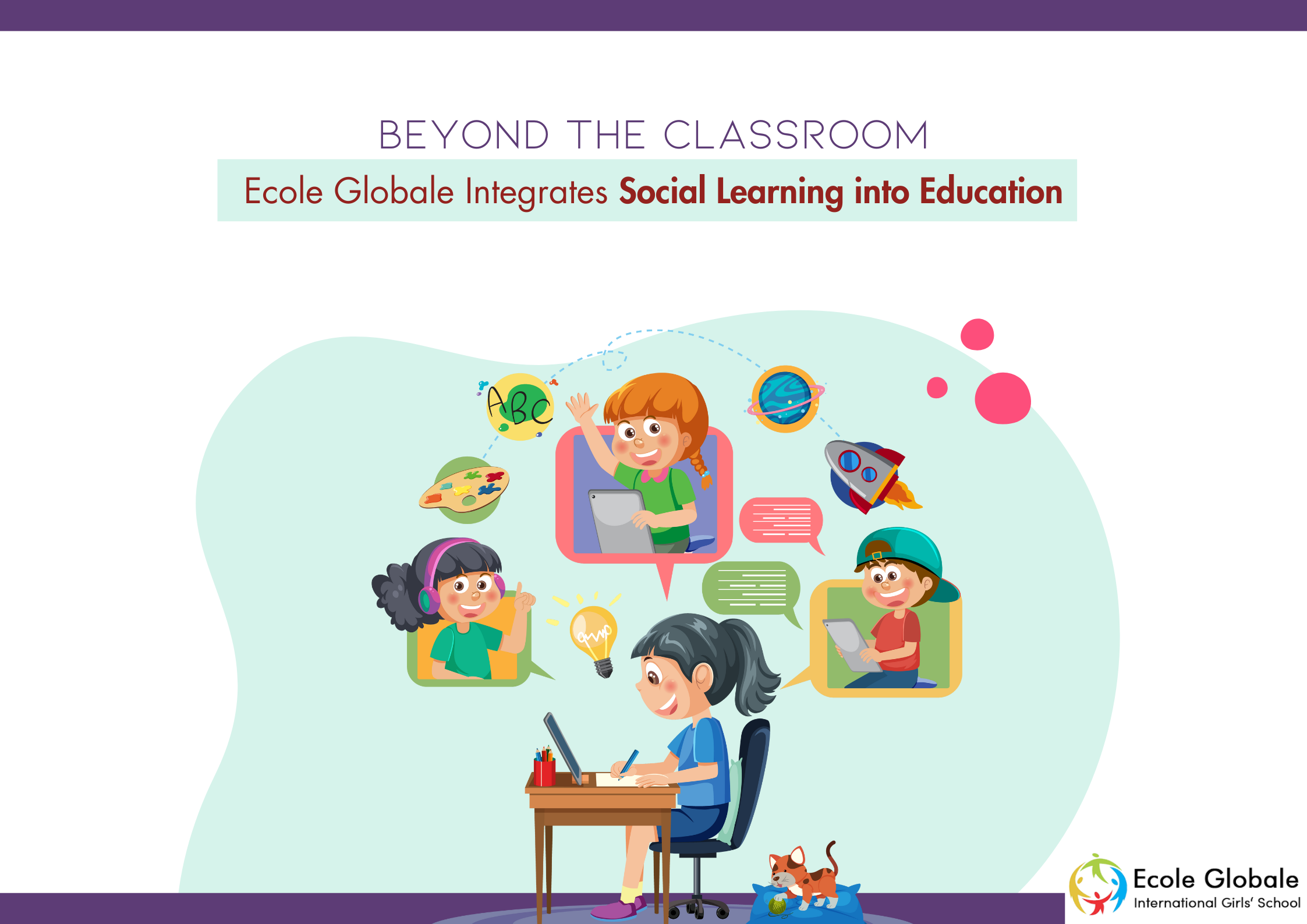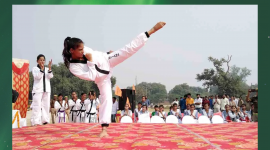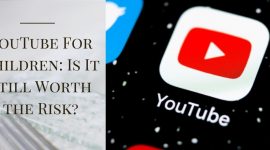Ecole Globale is not just an educational institution; it’s a hub of holistic development and innovative learning. Founded on the principles of providing a well-rounded education, Ecole Globale stands out for its commitment to nurturing not only academic excellence but also character, creativity, and and Social Learning into Education.
Importance of social learning in education
![]()
The traditional model of education often emphasizes individual achievement and competition. However, as society evolves, the importance of social learning becomes increasingly evident.
Social Learning into Education fosters collaboration, critical thinking, and adaptability – skills essential for success in the modern world. It goes beyond textbooks, encouraging students to engage with diverse perspectives and apply their knowledge in real-life scenarios.
Purpose of the discussion: Exploring Ecole Globale’s approach
This discussion aims to delve into how Ecole Globale, as an educational institution, has embraced the concept of social learning into education. By understanding their philosophy, strategies, and impact, we can gain valuable insights into the practical integration of social learning into education.
The Concept of Social Learning

Definition and significance of social learning into education
Social learning involves the acquisition of knowledge, skills, and attitudes through interaction and collaboration with others. It recognizes the importance of social context in the learning process, acknowledging that individuals learn not only from teachers but also from peers, mentors, and real-world experiences. Significantly, social learning prepares students for a dynamic and interconnected world.
Comparison with traditional classroom learning
Contrasting social learning with traditional classroom methods highlights the shift from a teacher-centered approach to a more student-centric, collaborative model. While traditional classrooms focus on lectures and rote memorization, social learning into education emphasizes active participation, discussion, and problem-solving in a group setting. This shift acknowledges the diverse ways in which students absorb and apply knowledge.
Real-world applications and benefits of social learning
Social learning into education mirrors the collaborative nature of professional environments and real-life situations. The benefits extend beyond academic achievement, fostering skills such as teamwork, communication, and adaptability.
Moreover, it prepares students for the challenges of a globalized world where diverse perspectives and effective collaboration are crucial for success.
Ecole Globale’s Educational Philosophy

Overview of Ecole Globale’s educational approach
Ecole Globale adopts a holistic approach to education, recognizing that academic excellence is just one facet of a student’s development. The institution is committed to cultivating well-rounded individuals equipped with not only knowledge but also a sense of responsibility, empathy, and leadership.
Emphasis on holistic development
The holistic development approach at Ecole Globale encompasses academic, physical, emotional, and social dimensions. The curriculum is designed not only to impart subject-specific knowledge but also to instill values, ethics, and a global perspective.
This comprehensive education ensures that students graduate with a broad skill set, ready to navigate the complexities of the world beyond the classroom.
Integration of social learning into the school’s mission and vision
Ecole Globale’s mission and vision statements reflect a commitment to social learning into education. The institution actively integrates collaborative and experiential learning opportunities into its curriculum.
This integration is not a mere supplement but a fundamental aspect of the educational philosophy, aligning with the belief that students learn best when engaged in meaningful interactions with their peers and the world around them.
Social Learning Strategies at Ecole Globale

Collaborative Learning Environments
- Group projects and activities
Ecole Globale promotes collaborative learning through group projects and activities that require students to work together to solve problems, express ideas, and achieve common goals. These activities go beyond traditional assignments, encouraging students to tap into the collective intelligence of the group, fostering creativity and critical thinking.
- Teamwork and problem-solving
Teamwork is not just a buzzword at Ecole Globale; it’s a fundamental skill woven into the fabric of the learning experience. Students engage in collaborative problem-solving exercises that mimic real-world challenges. By navigating these scenarios together, students not only enhance their academic understanding but also develop essential interpersonal and problem-solving skills.
Experiential Learning Opportunities
- Field trips and excursions
Ecole Globale understands that learning extends beyond the classroom walls. Regular field trips and excursions are integral to the curriculum, providing students with opportunities to explore diverse environments, cultures, and industries. These experiences not only reinforce academic concepts but also expose students to the richness and complexity of the world they inhabit.
- Internships and community service programs
Going beyond theoretical knowledge, Ecole Globale incorporates internships and community service programs into its educational framework. By engaging with the community and the professional world, students gain practical insights, apply their academic learning in real-life situations, and develop a sense of social responsibility.
Technology in Social Learning into Education
- Utilization of online platforms
Ecole Globale embraces technology as an enabler of social learning into education. Online platforms are utilized to facilitate collaborative projects, virtual discussions, and knowledge-sharing. This integration of technology not only mirrors the digital landscape students will encounter in their future careers but also allows for global connectivity and collaboration.
- Virtual collaborations and global connections
The school encourages virtual collaborations with students from diverse geographical locations. Through video conferences, collaborative projects, and online forums, Ecole Globale students connect with peers worldwide, fostering a global perspective. This not only enriches their learning experience but also prepares them for a world where cross-cultural communication is increasingly important.
Challenges and Solutions

Potential challenges in implementing social learning
Despite the numerous benefits, implementing social learning comes with its set of challenges. These may include resistance to change, logistical issues in organizing collaborative activities, and varying levels of student engagement. Recognizing and addressing these challenges is crucial to the successful integration of social learning into the curriculum.
Ecole Globale’s strategies to overcome these challenges
Ecole Globale employs a proactive approach to address challenges associated with social learning into education. This includes providing professional development opportunities for teachers to adapt to new methodologies, creating a supportive infrastructure for collaborative activities, and continuously refining strategies based on feedback from both educators and students.
Continuous improvement and adaptation based on feedback
One of Ecole Globale’s strengths lies in its commitment to continuous improvement. The institution actively seeks feedback from students, teachers, and parents regarding the effectiveness of social learning strategies. This feedback loop ensures that the curriculum remains dynamic and responsive to the evolving needs of the educational community.
Lessons for the Wider Education Community

Insights and lessons for other educational institutions
Ecole Globale’s experience provides valuable insights for other educational institutions seeking to embrace social learning. Key lessons include the importance of aligning social learning with the overall educational philosophy, integrating it into the mission and vision of the institution, and fostering a culture that values collaboration and experiential learning.
Recommendations for integrating social learning
Based on Ecole Globale’s success, recommendations for integrating social learning into diverse educational settings can be distilled. These may include offering professional development for educators, creating flexible and adaptable curricula, and establishing partnerships with industries and communities to provide real-world experiences for students.
The role of educators, students, and parents
Ecole Globale recognizes the collaborative nature of social learning, involving not just students but also educators and parents. Educators play a pivotal role in facilitating and guiding collaborative activities, students actively engage in the learning process, and parents are encouraged to support and reinforce these principles at home. This tripartite collaboration ensures a holistic and consistent approach to social learning.
Future Directions and Innovations
 ‘
‘
Ongoing developments and innovations in social learning at Ecole Globale
Ecole Globale remains at the forefront of educational innovation, continuously evolving its social learning into education strategies. This section explores ongoing developments, such as the incorporation of emerging technologies, adjustments in response to societal changes, and the exploration of new collaborative models to keep pace with an ever-changing world.
Anticipated trends in the evolution of social learning
As the educational landscape evolves, certain trends in social learning into education are anticipated. These may include increased integration of artificial intelligence, virtual reality, and augmented reality to enhance collaborative experiences.
Additionally, the emphasis on global collaboration and cultural exchange is expected to grow, preparing students for a more interconnected future.
The potential impact on the future of education globally
Ecole Globale’s commitment to social learning into education transcends its immediate impact; it has the potential to shape the future of education globally. By demonstrating the efficacy of a holistic, collaborative approach, the institution contributes to a broader conversation on educational reform.
The ripple effect of these innovations may inspire other institutions and policymakers to reconsider and adapt their approaches to better prepare students for the challenges of the 21st century.
Conclusion
Ecole Globale’s integration of social learning into education is a testament to the institution’s commitment to holistic education. From collaborative learning environments to experiential opportunities and technological integration, the school’s approach goes beyond traditional paradigms, preparing students for success in a rapidly changing world.
Ecole Globale’s unique contribution lies in its holistic philosophy, strategic implementation of social learning into education and continuous commitment to improvement.
The institution serves as a model for those seeking to go beyond conventional educational methods, showcasing the transformative potential of a curriculum that prioritizes collaboration, experiential learning, and global perspectives.









